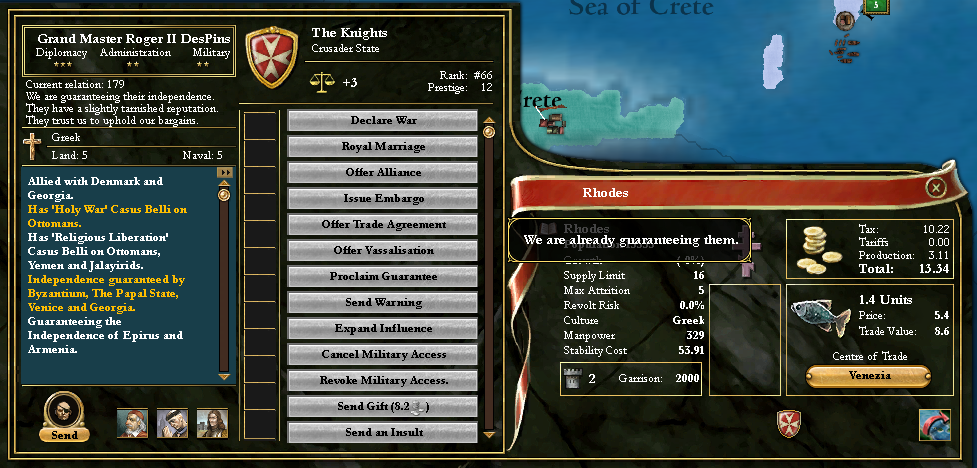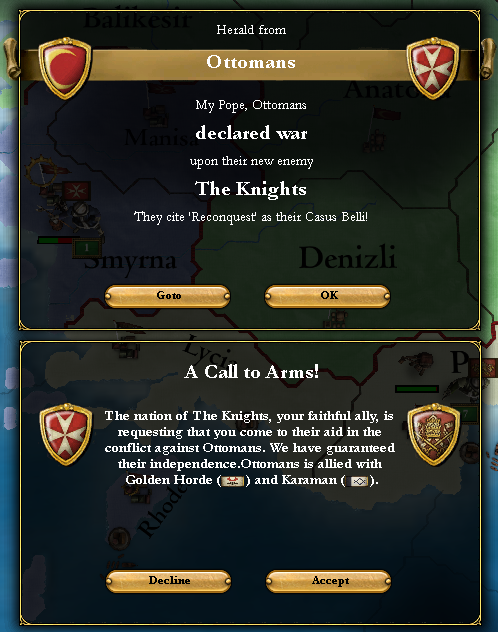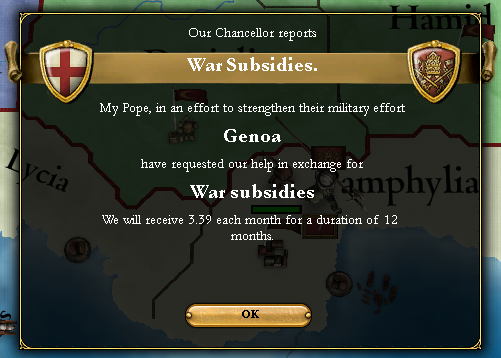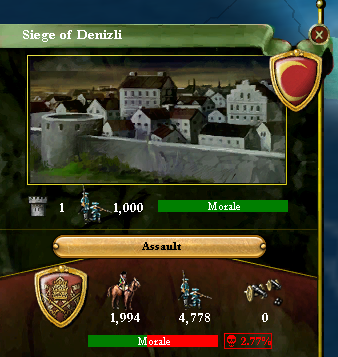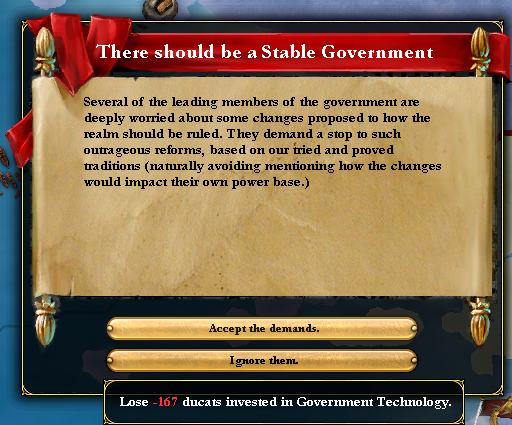Chapter 3: The Seven Churches of Asia, Part I
"The revelation from Jesus Christ, which God gave him to show his servants what must soon take place. He made it known by sending his angel to his servant John, who testifies to everything he saw—that is, the word of God and the testimony of Jesus Christ. Blessed is the one who reads aloud the words of this prophecy, and blessed are those who hear it and take to heart what is written in it, because the time is near." - The Book of Revelation Chapter 1, Verses 1-3
On the 5th of April, 1359, a letter was sent to Pope Innocent VI from the Christian communities in Anatolia asking for help against their Muslim overlords. The Pope, interested in weakening the Muslims now encroaching on the borders of Christian Europe, sent a reply requesting ample preparations be made by the Christians in Anatolia for a Crusade against these Muslims and send a reply back to Avignon the moment they are well-prepared.

Only surviving copy of the pastoral letter of Innocent VI to the Christians in Anatolia
10 days later, Innocent VI commissioned Cardinal Albornoz to Rhodes and Smyrna to learn more about the region. Albornoz returned five months later and wrote a full report to Pope Innocent VI stating that with the war currently ongoing between the Crusader State of the Knights of Rhodes and Mentese, the easiest way to establish a foothold on the region would be through the Beylik of Mentese.
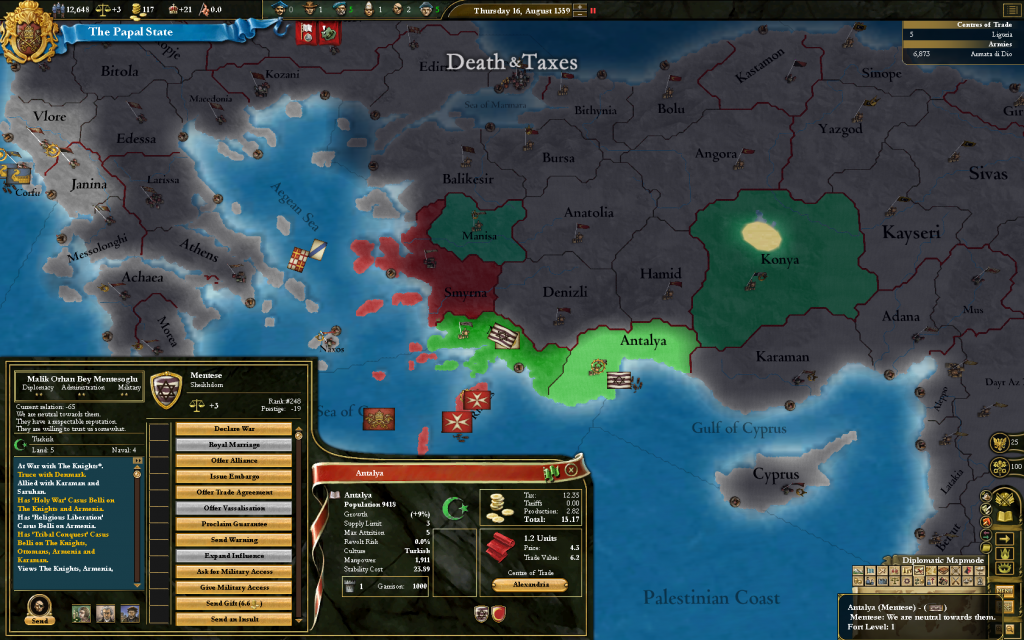
On the 29th of August, the Condottieri and the papal levies sailed across the Mediterranean and lied in wait off the coast of Rhodes while a papal envoy was sent to Malik Orhan Bey Mentesoglu, demanding the release of Christian areas in Mentese to the Pope. 8 days later, the decapitated head of the envoy was found by a Greek fisherman floating off the coast of Mentese. Enraged, the Pope immediately declared a crusade against the Muslim state of Mentese. Envoys were sent to the Kingdom of Naples and County of Savoy, requesting their help in the crusade against Mentese. The following day, the envoys returned with the full support of both nations. On the same day, the Muslim states of Karaman and Saruhan, allies of Mentese, declared war against the Papal States.
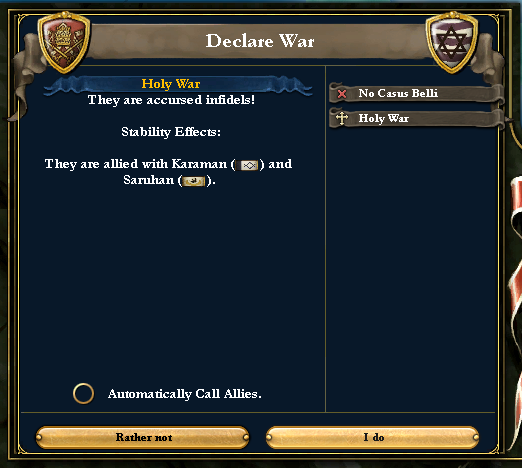
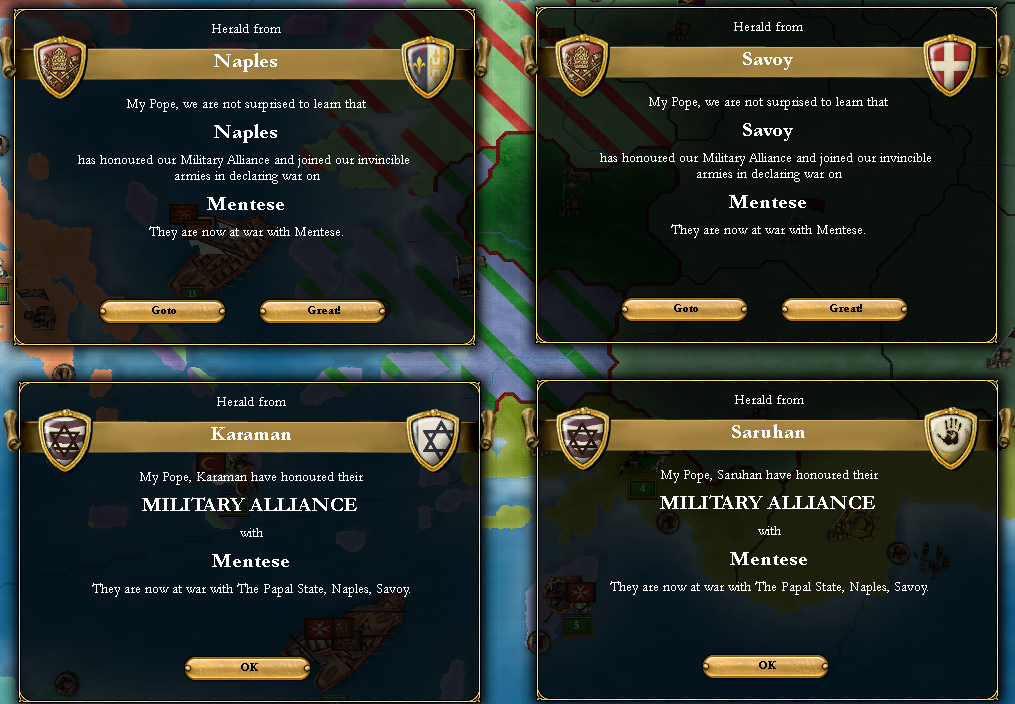
On the 19th of September, a 7,000-strong Papal army landed near Antalya, the capital of the state of Mentese, and immediately besieged the town. On the 27th, Pope Innocent VI, accompanied by Cardinal Albornoz and Camerlengo Stefano Aldebrandi Cambaruti, arrived in Antalya to lead the Papal army but the Camerlengo would die a few months later. Two weeks later, a Papal scout spotted the Mentese army coming down the coast from Mugla. On the morning of the 10th of October, the Papal army engaged the 4,000-strong Mentese army near the town of Kumluca, a few kilometers south of Antalya.
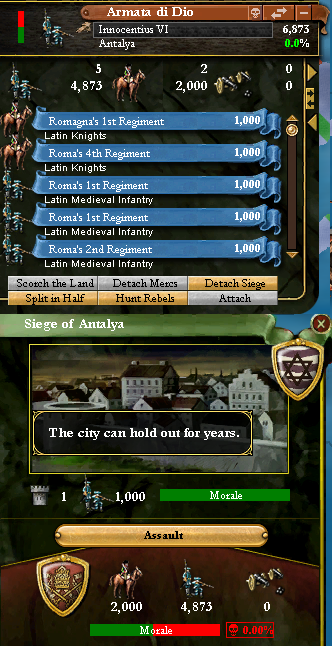
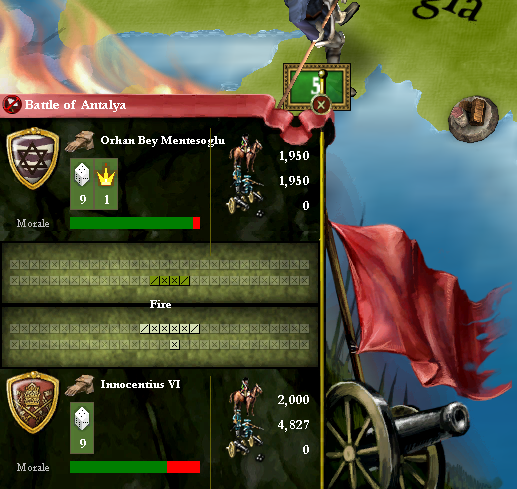
Due to the overwhelming forces of the Pope, the Mentese army was decisively defeated and retreated to Konya, losing over 2,000 troops compared to over 600 in the Papal army.

By late-October, Neapolitan and Savoyard troops landed in Smyrna which was controlled by Mentese and Saruhan. A few weeks later, the Knights launched a naval invasion of Mugla and defeated the Saruhan troops stationed there. Cut off from their territories in Manisa, the Saruhan troops surrendered to the Neapolitan-Savoyard troops in Smyrna on the 22nd of November. A few days later, Papal troops arrived and besieged Milas, the capital of the province of Mugla.
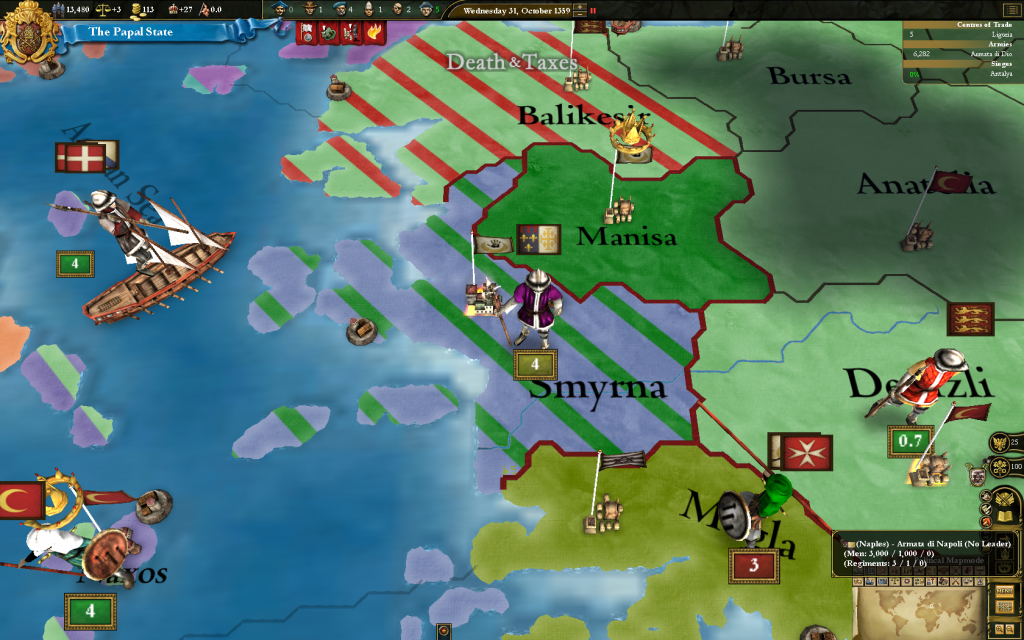
By the end of the year, the Muslim states were losing decisively against the Papal States, Naples and Savoy.
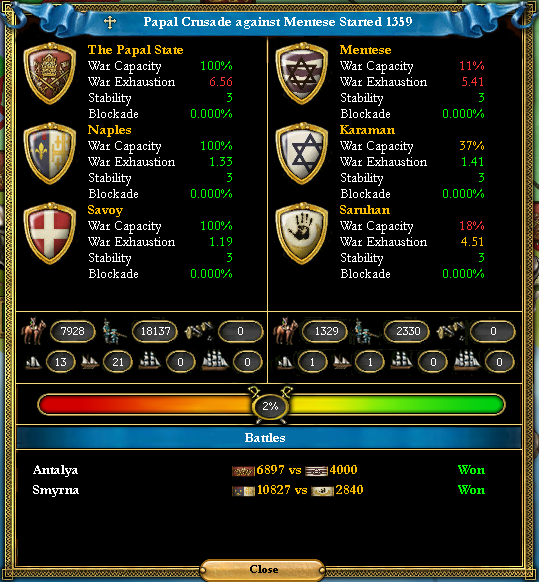
In an attempt to relieve the town of Antalya, on the 19th of February, 1360, Mentese and Karaman troops from Konya engaged the Papal troops besieging Antalya near the town of Manavgat.
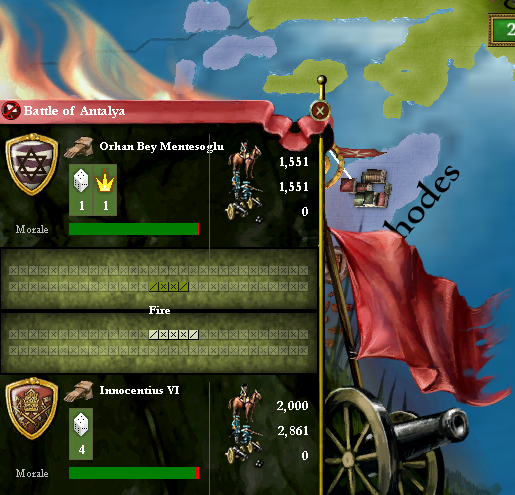
Losing battle after battle, the states of Mentese and Saruhan requested for a white peace to which Pope Innocent VI declined.
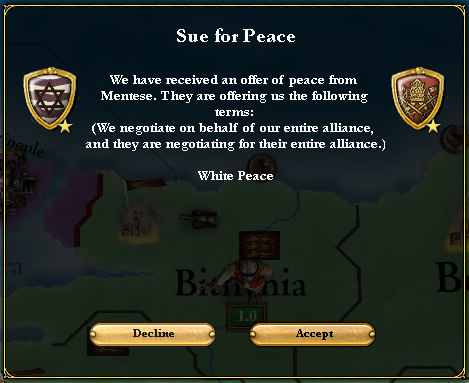
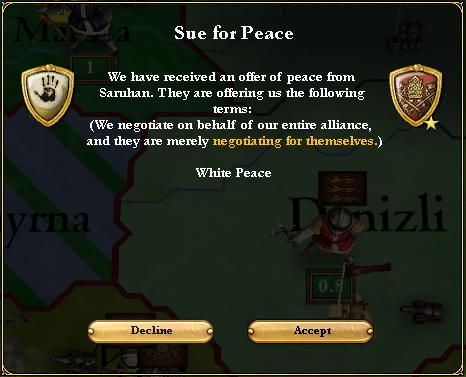
On the 1st of April, the Papal troops won a crushing victory over the Mentese-Karaman forces in the battle of Manavgat, only losing over 700 troops to the 3,000 troops of Mentese and Karaman. The Mentese troops retreated to Mugla while the Karaman troops retreated to Konya.
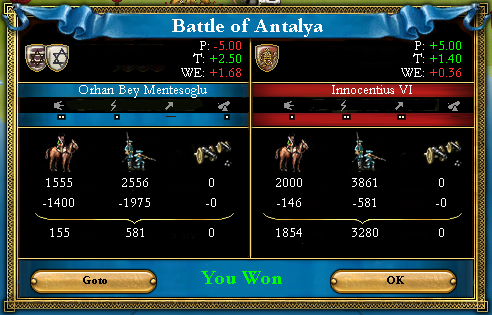
20 days after the defeat at Manavgat, the garrison at Antalya surrendered to the Papal troops.
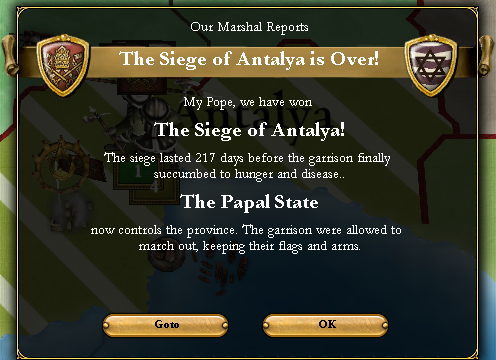
The remnants of the Mentese army was finally defeated in the battle of Mugla by the Papal army besieging Milas on the 16th of May.
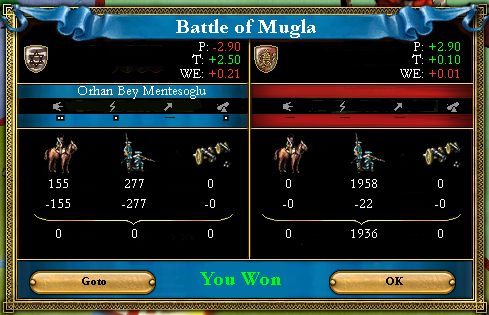
On the 13th of May, a Saruhan envoy again requested for a white peace with the Pope. But, with victory near at hand, Pope Innocent VI dismissed the envoy.
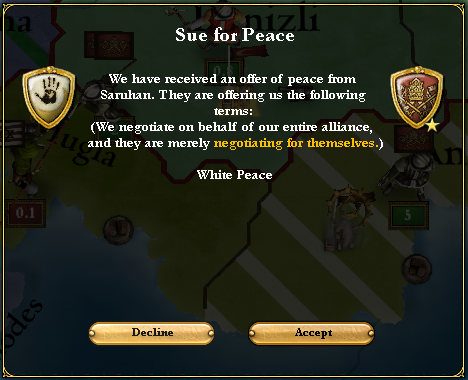
Finally, on the 21st of October, 1360, the garrison at Milas finally surrendered to the Papal forces.
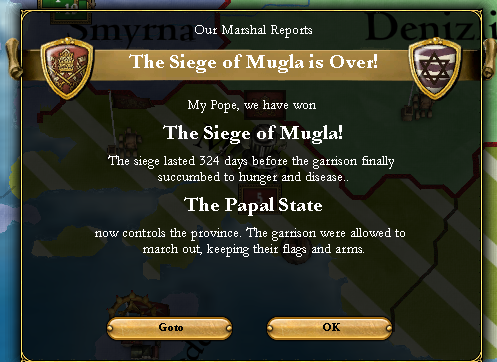
With the defeat of Saruhan at the hands of the Knights of Rhodes and the fall of Milas, Orhan Bey Mentesoglu agreed to an unconditional surrender and the annexation of the two provinces of Mugla and Antalya by the Papal States. A few days later, Orhan Bey committed suicide in the dungeon of his former castle in Antalya.
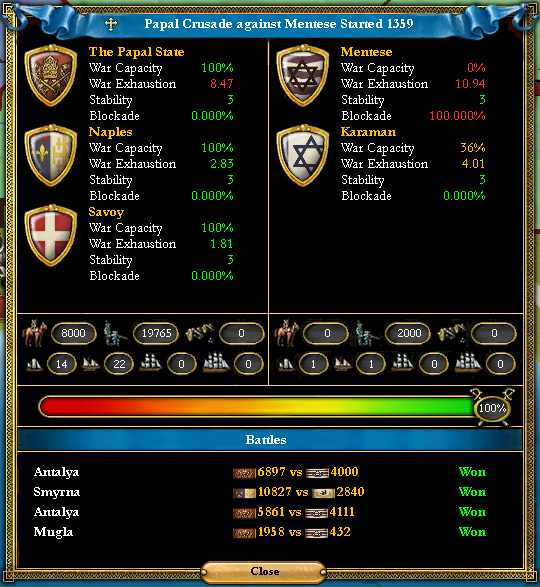
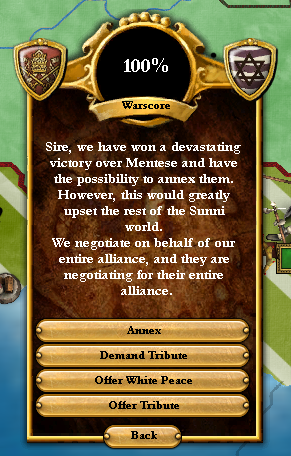
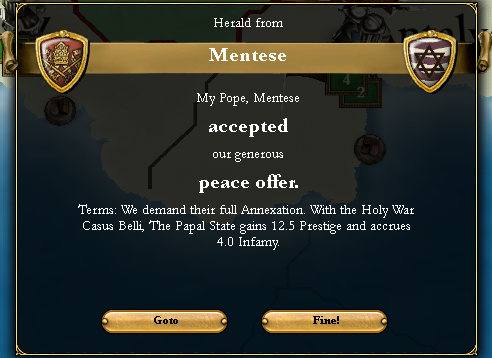
Two months after the Mentese crusade, Pope Innocent VI renamed the two provinces of Mugla and Antalya to Lycia and Pamphylia respectively, the names of these two provinces during the time of Jesus Christ.
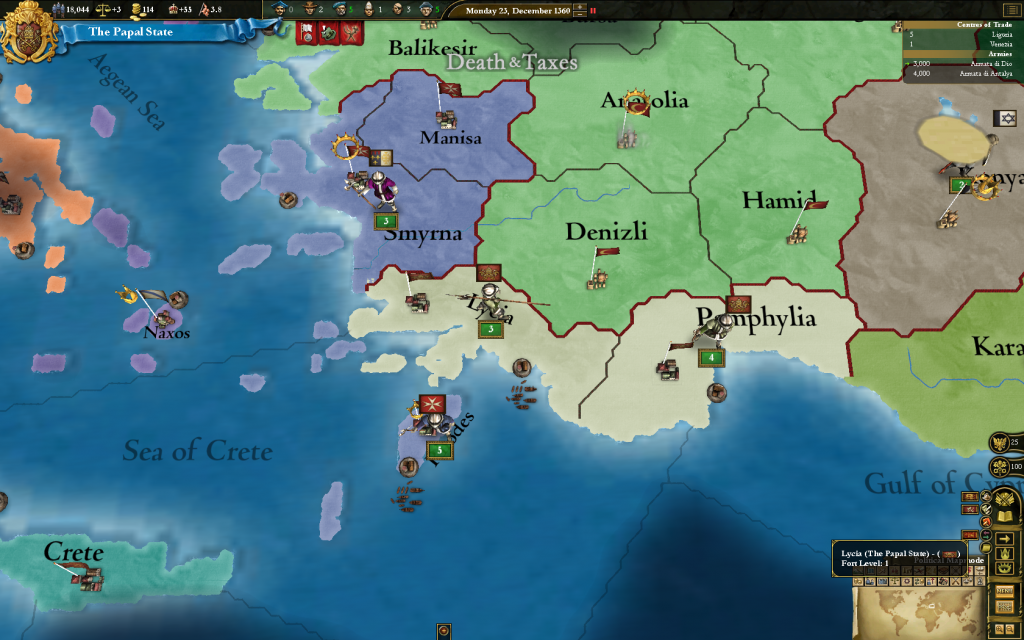
A few days later, realizing that their two territories are separated by Lycia, the Knights of Rhodes sent an envoy to Pope Innocent VI requesting for military access. With the help given by the Knights, Pope Innocent VI accepted the request unconditionally. A few months later, Pope Innocent VI also requested for military access to the Knights' territories, which was accepted.
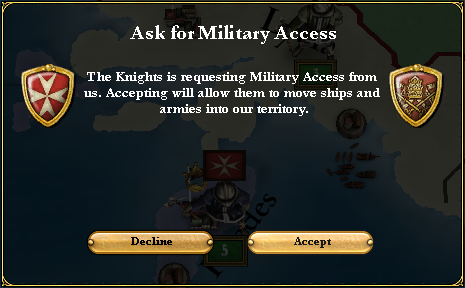
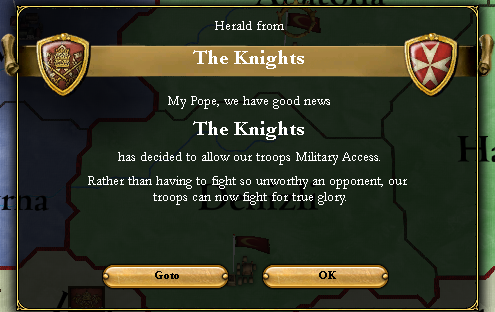
An internal problem occurred on the 12th of April, 1361, when a Muslim Turk revolt began in Lycia headed by the nephew of Orhan Bey Mentesoglu. Knowing full well that a Muslim revolt would end badly, Pope Innocent VI negotiated with the rebels, agreeing to pay them 30 ducats, a decrease in the taxes in the Lycia until September and freedom for Muslims to leave Lycia into Ottoman territory.
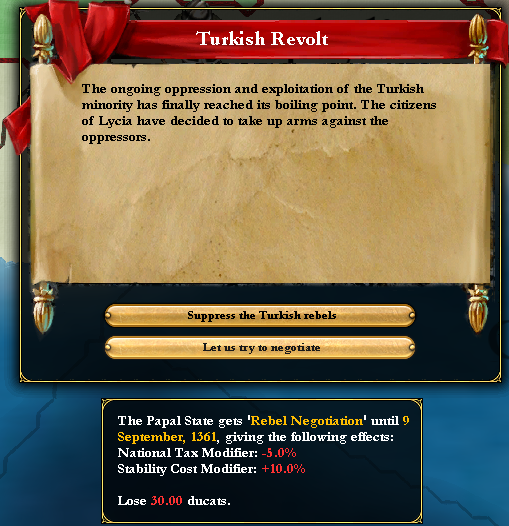
Another internal problem plagued the Papal States when on the 28th of February, a liberal group began rallies in town centers all across Rome and Romagna. Being a slight liberal himself, Pope Innocent VI agreed to increase liberalism in the Papal States and give free thinkers more freedom of speech in exchange for ending the rallies, angering the more conservative cardinals and the traditionalist people.
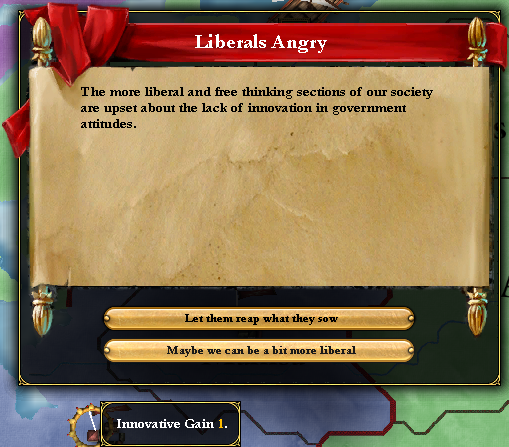
A few days later, Pope Innocent VI laid claim to the provinces of Modena, Abruzzi, Ferrera and Firenze, noting that these provinces were de jure Papal territories, having been handed to the local nobility in exchange for money. However, the local nobility dismissed the claims and stopped the entry of Papal troops when they came to project Papal sovereignty over these provinces. Pope Innocent VI demanded their annexation by giving them an 8-month ultimatum.
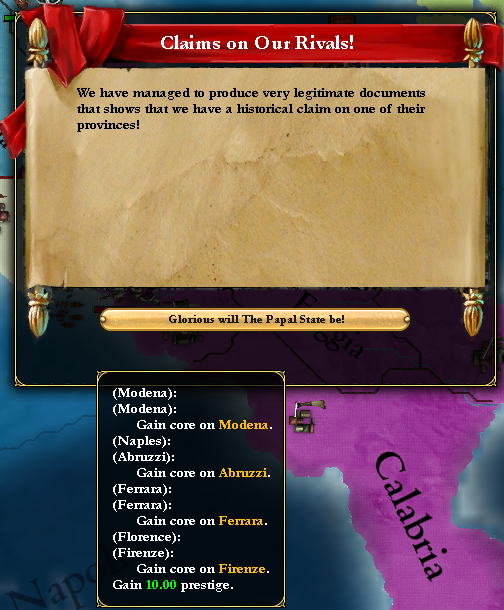
However, on the 27th of May, 1362, Pope Innocent VI fell ill whilst in Lycia and despite disagreements, was requested to return to Avignon by Cardinal Albornoz and the newly-appointed Camerlengo, Arnaud Aubert. He did not make it to Avignon, dying while at sea near Sicily on the 9th of June. News of his death arrived in Lycia, where Cardinal Albornoz was stationed, overseeing the Christian and Muslim communities there, on the 12th, in Rome on the 15th and in Avignon, where Camerlengo Arnaud Aubert was, on the 16th. 15 days after the news arrived in Avignon, the College of Cardinals, mostly made up of French cardinals, entered into conclave. Four days later, on the 5th of July, French Cardinal de Beauvais, legate to the County of Savoy, was elected as the new Pope. During his coronation on the 6th, he took the name Innocent VII.
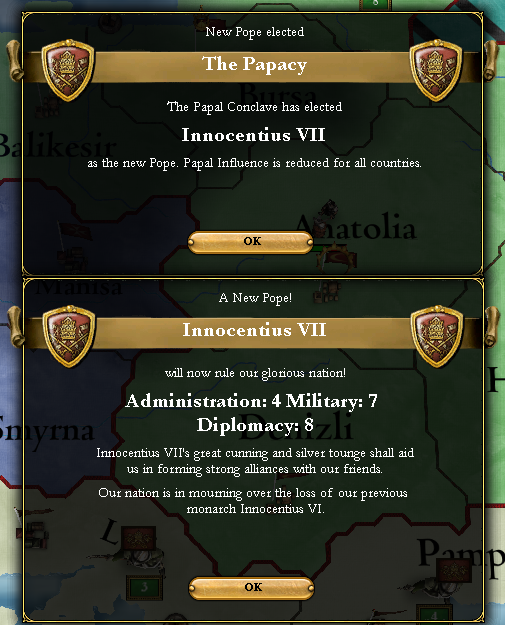
CHAPTER 3: THE SEVEN CHURCHES OF ASIA, PART I
"The revelation from Jesus Christ, which God gave him to show his servants what must soon take place. He made it known by sending his angel to his servant John, who testifies to everything he saw—that is, the word of God and the testimony of Jesus Christ. Blessed is the one who reads aloud the words of this prophecy, and blessed are those who hear it and take to heart what is written in it, because the time is near." - The Book of Revelation Chapter 1, Verses 1-3
On the 5th of April, 1359, a letter was sent to Pope Innocent VI from the Christian communities in Anatolia asking for help against their Muslim overlords. The Pope, interested in weakening the Muslims now encroaching on the borders of Christian Europe, sent a reply requesting ample preparations be made by the Christians in Anatolia for a Crusade against these Muslims and send a reply back to Avignon the moment they are well-prepared.

Only surviving copy of the pastoral letter of Innocent VI to the Christians in Anatolia
10 days later, Innocent VI commissioned Cardinal Albornoz to Rhodes and Smyrna to learn more about the region. Albornoz returned five months later and wrote a full report to Pope Innocent VI stating that with the war currently ongoing between the Crusader State of the Knights of Rhodes and Mentese, the easiest way to establish a foothold on the region would be through the Beylik of Mentese.

On the 29th of August, the Condottieri and the papal levies sailed across the Mediterranean and lied in wait off the coast of Rhodes while a papal envoy was sent to Malik Orhan Bey Mentesoglu, demanding the release of Christian areas in Mentese to the Pope. 8 days later, the decapitated head of the envoy was found by a Greek fisherman floating off the coast of Mentese. Enraged, the Pope immediately declared a crusade against the Muslim state of Mentese. Envoys were sent to the Kingdom of Naples and County of Savoy, requesting their help in the crusade against Mentese. The following day, the envoys returned with the full support of both nations. On the same day, the Muslim states of Karaman and Saruhan, allies of Mentese, declared war against the Papal States.


On the 19th of September, a 7,000-strong Papal army landed near Antalya, the capital of the state of Mentese, and immediately besieged the town. On the 27th, Pope Innocent VI, accompanied by Cardinal Albornoz and Camerlengo Stefano Aldebrandi Cambaruti, arrived in Antalya to lead the Papal army but the Camerlengo would die a few months later. Two weeks later, a Papal scout spotted the Mentese army coming down the coast from Mugla. On the morning of the 10th of October, the Papal army engaged the 4,000-strong Mentese army near the town of Kumluca, a few kilometers south of Antalya.


Due to the overwhelming forces of the Pope, the Mentese army was decisively defeated and retreated to Konya, losing over 2,000 troops compared to over 600 in the Papal army.

By late-October, Neapolitan and Savoyard troops landed in Smyrna which was controlled by Mentese and Saruhan. A few weeks later, the Knights launched a naval invasion of Mugla and defeated the Saruhan troops stationed there. Cut off from their territories in Manisa, the Saruhan troops surrendered to the Neapolitan-Savoyard troops in Smyrna on the 22nd of November. A few days later, Papal troops arrived and besieged Milas, the capital of the province of Mugla.

By the end of the year, the Muslim states were losing decisively against the Papal States, Naples and Savoy.

In an attempt to relieve the town of Antalya, on the 19th of February, 1360, Mentese and Karaman troops from Konya engaged the Papal troops besieging Antalya near the town of Manavgat.

Losing battle after battle, the states of Mentese and Saruhan requested for a white peace to which Pope Innocent VI declined.


On the 1st of April, the Papal troops won a crushing victory over the Mentese-Karaman forces in the battle of Manavgat, only losing over 700 troops to the 3,000 troops of Mentese and Karaman. The Mentese troops retreated to Mugla while the Karaman troops retreated to Konya.

20 days after the defeat at Manavgat, the garrison at Antalya surrendered to the Papal troops.

The remnants of the Mentese army was finally defeated in the battle of Mugla by the Papal army besieging Milas on the 16th of May.

On the 13th of May, a Saruhan envoy again requested for a white peace with the Pope. But, with victory near at hand, Pope Innocent VI dismissed the envoy.

Finally, on the 21st of October, 1360, the garrison at Milas finally surrendered to the Papal forces.

With the defeat of Saruhan at the hands of the Knights of Rhodes and the fall of Milas, Orhan Bey Mentesoglu agreed to an unconditional surrender and the annexation of the two provinces of Mugla and Antalya by the Papal States. A few days later, Orhan Bey committed suicide in the dungeon of his former castle in Antalya.



Two months after the Mentese crusade, Pope Innocent VI renamed the two provinces of Mugla and Antalya to Lycia and Pamphylia respectively, the names of these two provinces during the time of Jesus Christ.

A few days later, realizing that their two territories are separated by Lycia, the Knights of Rhodes sent an envoy to Pope Innocent VI requesting for military access. With the help given by the Knights, Pope Innocent VI accepted the request unconditionally. A few months later, Pope Innocent VI also requested for military access to the Knights' territories, which was accepted.


An internal problem occurred on the 12th of April, 1361, when a Muslim Turk revolt began in Lycia headed by the nephew of Orhan Bey Mentesoglu. Knowing full well that a Muslim revolt would end badly, Pope Innocent VI negotiated with the rebels, agreeing to pay them 30 ducats, a decrease in the taxes in the Lycia until September and freedom for Muslims to leave Lycia into Ottoman territory.

Another internal problem plagued the Papal States when on the 28th of February, a liberal group began rallies in town centers all across Rome and Romagna. Being a slight liberal himself, Pope Innocent VI agreed to increase liberalism in the Papal States and give free thinkers more freedom of speech in exchange for ending the rallies, angering the more conservative cardinals and the traditionalist people.

A few days later, Pope Innocent VI laid claim to the provinces of Modena, Abruzzi, Ferrera and Firenze, noting that these provinces were de jure Papal territories, having been handed to the local nobility in exchange for money. However, the local nobility dismissed the claims and stopped the entry of Papal troops when they came to project Papal sovereignty over these provinces. Pope Innocent VI demanded their annexation by giving them an 8-month ultimatum.

However, on the 27th of May, 1362, Pope Innocent VI fell ill whilst in Lycia and despite disagreements, was requested to return to Avignon by Cardinal Albornoz and the newly-appointed Camerlengo, Arnaud Aubert. He did not make it to Avignon, dying while at sea near Sicily on the 9th of June. News of his death arrived in Lycia, where Cardinal Albornoz was stationed, overseeing the Christian and Muslim communities there, on the 12th, in Rome on the 15th and in Avignon, where Camerlengo Arnaud Aubert was, on the 16th. 15 days after the news arrived in Avignon, the College of Cardinals, mostly made up of French cardinals, entered into conclave. Four days later, on the 5th of July, French Cardinal de Beauvais, legate to the County of Savoy, was elected as the new Pope. During his coronation on the 6th, he took the name Innocent VII.

Last edited:










